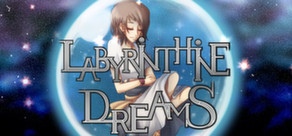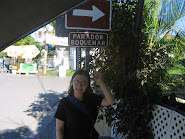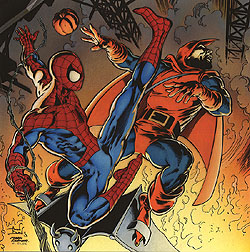
Virtual XI (1998)
Commercially, this is Iron Maiden's least successful album. The fandom's disappointment about the departure of Bruce Dickinson was no secret, but The X Factor benefited from curiosity about what the "new" Iron Maiden would be like. Three years later, this album's lackluster performance on the charts was indicative of the fandom's rejection of Dickinson's replacement, "Blaze" Bayley Cooke. This reaction was really sad and short-sighted - Iron Maiden's not some manufactured pop band where only the singer matters. Bruce's vocals are legend, but the band is full of great musicians. This was also another album released during a dark time for metal as a whole. The grunge boom was about over and now insipid "boy bands" were everywhere you looked. Those who preferred music involving actual instruments had to look elsewhere and the internet was not as developed as it is now.
With its often futuristic vibe and heavy use of keyboards, (Michael Kenney returned but this is also the album where Steve Harris started to play the keys himself) Virtual XI is similar to Somewhere in Time. While it is not the brooding epic that The X Factor was, it has some great songs and is a nice demonstration of the band's versatility.
Things get off to a very corny start with "Futureal." This song was written at the height of late-90s paranoia that the internet and online gaming would kill us all. That, combined with Blaze's dead serious vocals, make the song impossible to take seriously. Still, the riffs and solos are fun and some parts are surprisingly evocative of the very early Paul Di'Anno era of Iron Maiden.
 "The Angel and the Gambler" is one of the most unique, divisive and confounding songs in the band's entire discography. When that organ starts up, you might think you're listening to Boston rather than Iron Maiden. The upbeat story of a wayward rogue approached by a compassionate angel is held up by many fans as the poster child of everything that was wrong with the Blaze era. Some of them really hate this song. Most of it can be attributed to the fact that this is the most infamous example of the "repetition problem." The three-line chorus is repeated a whopping twenty-two times over the course of the ten-minute song.
"The Angel and the Gambler" is one of the most unique, divisive and confounding songs in the band's entire discography. When that organ starts up, you might think you're listening to Boston rather than Iron Maiden. The upbeat story of a wayward rogue approached by a compassionate angel is held up by many fans as the poster child of everything that was wrong with the Blaze era. Some of them really hate this song. Most of it can be attributed to the fact that this is the most infamous example of the "repetition problem." The three-line chorus is repeated a whopping twenty-two times over the course of the ten-minute song.Sorry, but I love this song. It's feel-good vibe is impossible to resist, the solo is superb, and the repetition doesn't really bother me. It is odd at first, but it's all part of a satisfying buildup that stretches several minutes. Frankly, there's another track that we'll get to later that is much more obnoxious in its repetition. The version of this song released as a single was actually shorted by six minutes, which did little to placate its detractors.
"Lightning Strikes Twice" is all about atmosphere. The instrumental work in the song is exceptional, creating vivid imagery in the head of the listener. The first half is more about buildup, evoking a darkening sky. Then everything kicks into high-gear. The centerpiece of this track is a blazing solo by Dave Murray that actually sounds like lightning. Really creative, impressive stuff.
The epic, emotional "The Clansman" is easily the best song on the album. It is considered the definitive Blaze vocal performance and still a favorite among fans. During the 90s, the Scottish struggle for independence in medieval times became prominent thanks to movies like Braveheart and Rob Roy. Steve Harris, who gets the sole writing credit, does a phenomenal job evoking the beauty of Scotland and the passion with which these medieval warriors fought. In an album with some odd pacing choices, the structure of this nine-minute epic feels just right.
"When Two Worlds Collide" is decent, but never really becomes all that interesting. It starts as a literal science-fiction tale of a planetary collision, but later uses the title as a metaphor for how differing cultures can come into conflict. "The Educated Fool" fares better. It's a very thoughtful, progressive song about how even the most intelligent person never really has all the answers. It also boasts some captivating riffs and a great middle section.
I'm happy to defend "The Angel and the Gambler," but when it comes to "Don't Look to the Eyes of a Stranger," the band is on its own. This song is very long and very repetitive. It seems to be about how the world feels a lot more dangerous when you have a child, but honestly, without all the repetitions the song's actual lyrics probably fit on a napkin. Still, even tiresome Maiden songs typically have fine guitar, bass and drums work and this is no exception.
The album closes on a surprisingly somber note with "Como Estais Amigos." The Falkland Islands War is probably not familiar to most Americans, but it will be for English citizens old enough to remember the 1980s. The United Kingdom and Argentina squabbled over who exactly owned tiny hunks of rock off the South American coast and numerous soldiers on both sides perished becuase of this pissing contest. Written by Janick Gers and Blaze, who had a friend who fought in this conflict, the song reaches out to the people of Argentina and urges both nations involved to commit to "no more tears." It's sad and powerful and makes ideal use of Blaze's low range.
___________________________________________
Overall Strengths: Each of this album's eight tracks is very distinctive, and the best ones are full of emotion.
Overall Weaknesses: The album can feel slight when compared to the gravitas and massive size of The X Factor. The repetition of phrases in some songs can get really problematic for some listeners.
Recommended Tracks
The Angel and the Gambler
Lightning Strikes Twice
The Clansman
Como Estais Amigos
Next: Big reunions ensue and the band kicks off a new decade with "Brave New World."




No comments:
Post a Comment